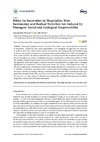Identificador persistente para citar o vincular este elemento:
https://accedacris.ulpgc.es/jspui/handle/10553/70133
| Campo DC | Valor | idioma |
|---|---|---|
| dc.contributor.author | Díaz Meneses, Gonzalo | en_US |
| dc.contributor.author | Nieves Rodríguez, Julia | en_US |
| dc.date.accessioned | 2020-02-05T12:52:36Z | - |
| dc.date.available | 2020-02-05T12:52:36Z | - |
| dc.date.issued | 2019 | en_US |
| dc.identifier.issn | 2071-1050 | en_US |
| dc.identifier.other | Scopus | - |
| dc.identifier.other | WoS | - |
| dc.identifier.uri | https://accedacris.ulpgc.es/handle/10553/70133 | - |
| dc.description.abstract | This paper proposes a model to explain how ethics play a role to produce innovation in hospitality. Literature from social responsibility and ecological management was reviewed in order to state how ethical values induce advances by stimulating teams and breakthroughs. A survey was carried out based on structured questionnaires, filled in by 134 hotel managers in Gran Canaria (Spain). By means of path analysis, it was demonstrated the antecedent role played by ethical management to cause knowledge exchange in employees, as well as innovations in hotels. Nevertheless, breakthroughs cannot be induced if there is an extrinsically motivated environmental management. To be more specific, radical innovation was produced at a higher rate if managers highlighted the importance of ethics over profit, rather than if they placed profitability ahead of ethical considerations, notwithstanding that both approaches tend to provoke disruptive novelties. In addition, incremental innovations are a consequence of knowledge exchange between hotel employees. Finally, knowledge exchange is induced in the context of ethical leadership consisting of general social responsibility. The conclusions drawn from this work are that ethics is a causative part of innovation and that practical implications provide specific and differential measures that help to bring about incremental and radical innovation. | en_US |
| dc.language | eng | en_US |
| dc.relation.ispartof | Sustainability (Switzerland) | en_US |
| dc.source | Sustainability (Switzerland) [ISSN 2071-1050], v. 11 (22) | en_US |
| dc.subject | 5311 Organización y dirección de empresas | en_US |
| dc.subject.other | Environmental Responsibility | en_US |
| dc.subject.other | Hospitality | en_US |
| dc.subject.other | Innovation | en_US |
| dc.subject.other | Knowledge Exchange | en_US |
| dc.subject.other | Responsibility | en_US |
| dc.subject.other | Social | en_US |
| dc.subject.other | Responsabilidad social corporativa | en_US |
| dc.subject.other | Market Orientation | en_US |
| dc.subject.other | Interpersonal-Trust | en_US |
| dc.subject.other | Leadership | en_US |
| dc.subject.other | Tourism | en_US |
| dc.subject.other | Knowledge | en_US |
| dc.subject.other | Performance | en_US |
| dc.subject.other | Service | en_US |
| dc.subject.other | Behavior | en_US |
| dc.subject.other | Sustainability | en_US |
| dc.title | Ethics for innovation in hospitality: How incremental and radical novelties are induced by managers' social and ecological responsibility | en_US |
| dc.type | info:eu-repo/semantics/article | en_US |
| dc.type | Article | en_US |
| dc.identifier.doi | 10.3390/su11226277 | en_US |
| dc.identifier.scopus | 85075859550 | - |
| dc.identifier.isi | 000503277900090 | - |
| dc.contributor.authorscopusid | 35723747600 | - |
| dc.contributor.authorscopusid | 55601292400 | - |
| dc.identifier.eissn | 2071-1050 | - |
| dc.identifier.issue | 22 | - |
| dc.relation.volume | 11 | en_US |
| dc.investigacion | Ciencias Sociales y Jurídicas | en_US |
| dc.type2 | Artículo | en_US |
| dc.contributor.daisngid | 10222565 | - |
| dc.contributor.daisngid | 3500171 | - |
| dc.description.numberofpages | 17 | en_US |
| dc.utils.revision | Sí | en_US |
| dc.contributor.wosstandard | WOS:Diaz-Meneses, G | - |
| dc.contributor.wosstandard | WOS:Nieves, J | - |
| dc.date.coverdate | Noviembre 2019 | en_US |
| dc.identifier.ulpgc | Sí | en_US |
| dc.contributor.buulpgc | BU-ECO | en_US |
| dc.description.sjr | 0,581 | |
| dc.description.jcr | 2,576 | |
| dc.description.sjrq | Q2 | |
| dc.description.jcrq | Q2 | |
| dc.description.scie | SCIE | |
| dc.description.ssci | SSCI | |
| dc.description.erihplus | ERIH PLUS | |
| item.fulltext | Con texto completo | - |
| item.grantfulltext | open | - |
| crisitem.author.dept | GIR IUCES: Dirección de Marketing, RSC y Empresa Familiar | - |
| crisitem.author.dept | IU de Cibernética, Empresa y Sociedad | - |
| crisitem.author.dept | Departamento de Economía y Dirección de Empresas | - |
| crisitem.author.dept | GIR Organización y dirección de empresas (Management) | - |
| crisitem.author.dept | Departamento de Economía y Dirección de Empresas | - |
| crisitem.author.orcid | 0000-0001-6260-385X | - |
| crisitem.author.orcid | 0000-0001-9796-038X | - |
| crisitem.author.parentorg | IU de Cibernética, Empresa y Sociedad | - |
| crisitem.author.parentorg | Departamento de Economía y Dirección de Empresas | - |
| crisitem.author.fullName | Díaz Meneses, Gonzalo | - |
| crisitem.author.fullName | Nieves Rodríguez, Julia | - |
| Colección: | Artículos | |
Citas SCOPUSTM
5
actualizado el 08-jun-2025
Citas de WEB OF SCIENCETM
Citations
7
actualizado el 01-feb-2026
Visitas
65
actualizado el 11-ene-2026
Descargas
69
actualizado el 11-ene-2026
Google ScholarTM
Verifica
Altmetric
Comparte
Exporta metadatos
Los elementos en ULPGC accedaCRIS están protegidos por derechos de autor con todos los derechos reservados, a menos que se indique lo contrario.
